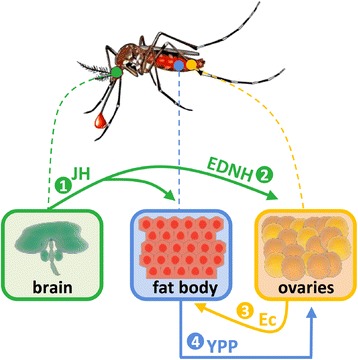Fig. 2.

Hormonal control of yolk formation. There are three invertebrate hormones that play major roles in yolk formation. Young females have a high level of juvenile hormone (JH), which is produced by corpora allata located in the arthropod brain and acts on fat body and ovaries (1). Upon a blood meal, the JH level drops in haemolymph, and egg development neurosecretory hormone (EDNH) (2) level increases to stimulate the release of ecdysone (Ec) (3) by ovaries that is converted in 20-hydroxyecdysona (20-HE) in the fat body. Together with 20-HE, the nutrients consumed during the blood meal stimulate the expression and secretion, by fat body cells, of yolk precursor proteins (YPP) (4) that are essential in vitellogenesis
